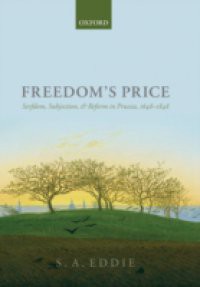It is usually claimed that serfs were oppressed and unfree, but is this assumption true? Freedoms Price, building on a new reading of archival material, attempts a fundamental re-appraisal of the continuing orthodoxy that a serf economy embodied peasant exploitation. It reveals that, in fact, Prussian subject peasants fared much better than their free neighbours; they had mutual rights and obligations with nobles and the state.In this volume, Sean Eddie seeks to establish the true price of freedom paid by the peasants both in the so-called Second Serfdom around 1650 and in the enfranchisement of 1807-21. Far from representing further exploitation, the peasants drove a hard bargain, and many nobles subsequently fared worse than their tenants; subjection was abolished and land ownership was transferred from noble to peasant. Capital was therefore at the centre of the pre-capitalist economy, and the growing economicpolarization of society owed more to the peasants access to capital than to noble exploitation. By locating Prussian serfdom and reforms in a pan-European context, and within debates about the nature of economic development, feudalism, and capitalism, Freedoms Price targets a wider audience of earlymodern and modern European historians, economic historians, and interested general readers.

